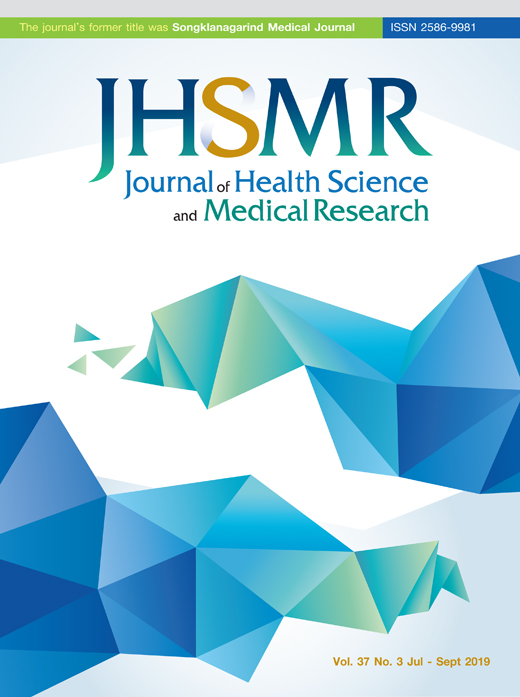Feasibility and Reliability of a Developed and Validated Forensic Recording Form for Firearm Injury
DOI:
https://doi.org/10.31584/jhsmr.201952Keywords:
clinical documentation, forensic, gunshot, recording formAbstract
Objective: The aim of this study was to develop and validate a forensic recording form for firearm injuries and test the feasibility and reliability of its application.
Material and Methods: A cross-sectional study was conducted. The first version was developed using knowledge from the literature search and was checked for validity by 3 forensic physicians using the Content Validity Index (CVI). Feasibility was tested among physicians working at 4 district hospitals. Its reliability was analyzed by 2 forensic physicians using prevalence-adjusted and bias-adjusted kappa.
Results: The validity of a developed recording form for firearm injuries was good, with a CVI of 0.8. All items were rated to be feasible, and the format of the recording was rated from good to excellent. The reliabilities ranged from poor agreement to perfect agreement. After considering the validity, feasibility and reliability tests, a final, forensic recording form was established.
Conclusion: A systematically constructed forensic recording form for firearm injuries, for any physicians, with less experience in the field of gunshot cases, was developed. This form will be helpful in assisting physicians in the completion of information for any gunshot cases, which may decrease the consequences from incomplete information.
References
2. The Global Burden of Disease 2016 Injury Collaborators. Global mortality from firearms, 1990-2016. JAMA 2018;320:792-814.
3. The Supreme Court of Thailand. Decided case 83/2552 [monograph on the Internet]. Bangkok: The Supreme Court of Thailand; 2011 [cited 2018 Jul 27]. Available from: https:// deka.in.th/view-501122.html
4. Panngoen W. The completeness of gun-shot wound register in medical record at Siriraj Hospital. Veridian E-Journal 2011;4:657-66.
5. Wright RK. Clinicians’ documentation of gunshot wounds. JAMA 1996;276:198.
6. Bhana BD, Kirk GM, Dada MA. Fatal firearm wounds: a clinicopathologic study. Am J Forensic Med Pathol 2003;24: 273-6.
7. Shuman M, Wright RK. Evaluation of clinician accuracy in describing gunshot wound injuries. J Forensic Sci 1999;44: 339-42.
8. Tanratanavijit M. Attending physician’s testifying in court. Srinagarind Med J 1998;13:217-8.
9. Dalby JT. On the witness stand: learning the courtroom tango. Can Fam Physician 2007;53:65-70.
10. Jitpiromsri S. An inconvenient truth about the deep south violent conflict: a decade of chaotic, constrained realities and uncertain resolution [monograph on the Internet]. Pattani: Deep South Watch; 2014 [cited 2015 Apr 19]. Available from: http://www.deepsouthwatch.org/node/5904
11. Ross RT, Hammen PF, Frantz EI, Paré LE, Boyd CR. Gunshot wounds: evaluating the adequacy of documentation at a level I trauma center. J Trauma 1998;45:151-2.
12. DiMaio VJ. Gunshot wounds: practical aspects of firearms, ballistics, and forensic techniques. 3rd ed. London: CRC Press; 2015.
13. Talungchit P, Liabsuetrakul T, Lindmark G. Development and assessment of indicators for quality of care in severe preeclampsia/eclampsia and postpartum hemorrhage. J Healthc Qual 2013;35:22–34.
14. Sim J, Wright CC. The Kappa statistic in reliability studies: use, interpretation, and sample size requirements. Phys Ther 2005;85:257-68.
15. Hoehler FK. Bias and prevalence effects on kappa viewed in terms of sensitivity and specificity. J Clin Epidemiol 2000;53:499-503.
16. Wollersheim H, Hermens R, Hulscher M, Braspenning J, Ouwens M, Schouten J, et al. Clinical indicators: development and applications. Neth J Med 2007;65:15-22.
17. Polit DF, Beck CT. The content validity index: are you sure you know what’s being reported? Critique and recommen dations. Res Nurs Health 2006;29:489-97.
18. SH Lee. Constructing effective questionnaire. In: Pershing JA, editor. Handbook of Human Performance Technology. 3rd ed. CA: Pfeiffer; 2006;p.760-79.
19. Cave R, DiMaio VJ, Molina DK. Homicide or suicide? gunshot wound interpretation: a Bayesian approach. Am J Forensic Med Pathol 2014;35:118-23.
20. Molina DK, DiMaio V, Cave R. Gunshot wounds: a review of firearm type, range, and location as pertaining to manner of death. Am J Forensic Med Pathol 2013;34:366-71.
21. Druid H. Site of entrance wound and direction of bullet path in firearm fatalities as indicators of homicide versus suicide. Forensic Sci Int 1997;88:147-62.
22. Brozek-Mucha Z. Trends in analysis of gunshot residue for forensic purposes. Anal Bioanal Chem 2017;409:5803-11.
23. Pinto A, Russo A, Reginelli A, Iacobellis F, Di Serafino M, Giovine S, et al. Gunshot wounds: ballistics and imaging findings. Semin Ultrasound CT MR 2019;40:25-35.
























